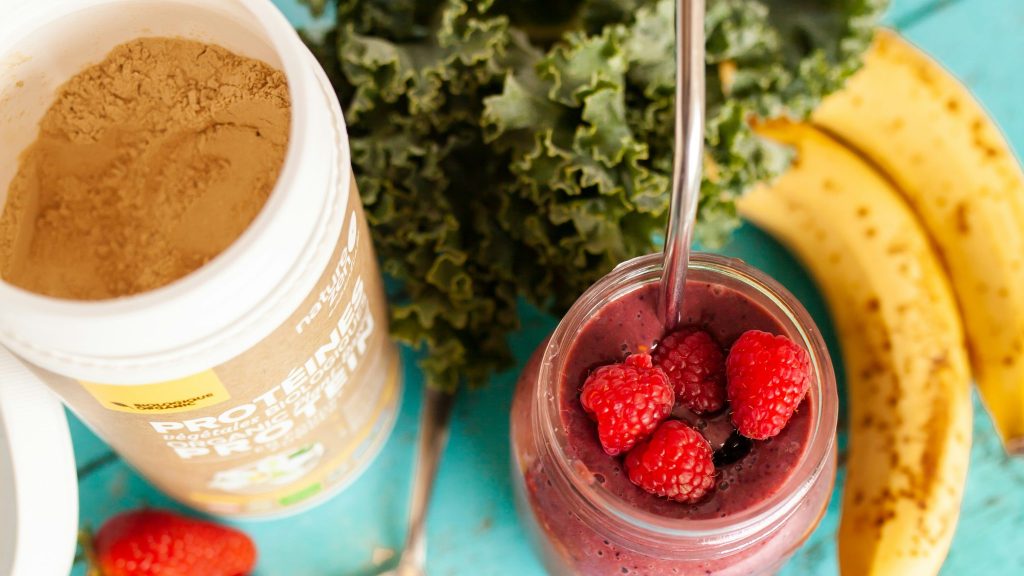Table of Contents
Protein plays a crucial role in muscle growth and recovery in fitness and bodybuilding. The effectiveness of muscle development depends significantly on the quality, not just the quantity, of protein consumed. Understanding the quality of protein is essential for optimizing muscle synthesis and recovery. This concept distinguishes proteins based on their amino acid composition, digestibility, and ability to facilitate muscle growth.
The quality of dietary protein directly impacts muscle growth and recovery. High-quality protein sources, characterized by their rich essential amino acid profiles and efficient absorption rates, are vital for nutrition strategies aimed at enhancing muscle synthesis. The significance of amino acids, particularly in muscle repair, cannot be overstated. Their role is critical in supporting the repair and growth of muscle tissue.
“Did you know that not all proteins are created equal when it comes to building muscle? Understanding the quality of the protein you consume can significantly impact your muscle growth and recovery efforts.”
Main Topics Covered:
- Understanding Protein Quality: Discusses what constitutes high-quality protein, focusing on amino acid composition and digestibility, crucial for muscle synthesis.
- Best Protein Sources for Muscle: Analyzes various protein sources and their benefits for muscle growth, including animal and plant-based proteins, and the differences between whey and casein.
- Amino Acids: Building Blocks of Muscle: Examines the role of amino acids, especially branched-chain amino acids (BCAAs), in muscle repair and growth.
- Optimizing Protein Intake for Muscle Gain: Offers strategies for calculating and timing protein intake to support muscle growth, considering daily protein needs and the importance of macronutrient balance.
- Protein Absorption and Muscle Growth: Explores how the body absorbs and utilizes protein and how dietary choices can enhance muscle growth through improved protein absorption.
The quality of protein is a critical factor in the diet of individuals seeking to improve their muscle mass and recovery. By focusing on high-quality protein sources that are effectively utilized by the body, individuals can maximize their muscle-building potential. The selection of protein sources, understanding of amino acids’ roles, and strategies for optimizing protein intake are fundamental in developing a diet that supports muscle growth and recovery. This article aims to demystify the concept of protein quality and guide readers in making informed dietary choices to enhance their fitness outcomes. Through a detailed examination of protein quality and its implications for muscle growth, readers will gain the knowledge needed to optimize their dietary plans, leading to more effective muscle development and recovery.
Protein Quality and Its Impact on Muscle Growth
Protein quality is fundamental in the field of nutrition, especially for individuals focusing on muscle growth and recovery. The concept extends beyond simple quantity, emphasizing the efficiency with which the body utilizes consumed protein for muscle synthesis. It’s essential to grasp the factors that define protein quality to tailor dietary intake towards optimal muscle development.
Amino Acid Profile Determines Protein Quality
The amino acid profile of a protein source significantly determines its quality. Proteins consist of amino acids, with certain types deemed essential because the body is incapable of producing them. These essential amino acids (EAAs) must be obtained through one’s diet. The presence and ratio of EAAs in a protein influence its capability to foster muscle growth. For effective muscle tissue repair and development, a protein should encompass all EAAs in sufficient quantities. The notion of ‘complete’ versus ‘incomplete’ proteins comes into play here, with complete proteins containing all nine EAAs in necessary amounts. This distinction is vital for those aiming to maximize muscle growth, as consuming complete proteins ensures the availability of all required building blocks for muscle repair and synthesis.
“Leucine is known as the ‘trigger’ for muscle protein synthesis, showcasing its unique role among essential amino acids in promoting muscle growth.”
Digestibility and PDCAAS in Protein Quality
Digestibility also plays a crucial role in determining protein quality, as measured by the Protein Digestibility Corrected Amino Acid Score (PDCAAS). This index evaluates a protein’s amino acid profile against human body requirements and adjusts the score based on protein digestibility. High PDCAAS values indicate that a protein is not only complete in terms of amino acid content but also highly digestible, rendering it superior for muscle synthesis. The PDCAAS is a valuable metric for assessing the quality of different protein sources, guiding individuals towards the most beneficial proteins for their dietary needs.
The Critical Role of Leucine in Muscle Protein Synthesis
Leucine, a critical essential branched-chain amino acid (BCAA), is particularly influential in muscle protein synthesis. Its role is pivotal, as leucine acts as a key regulator for initiating the muscle protein synthesis process. The presence of leucine in adequate amounts is thus a crucial factor in evaluating the quality of a protein source. Foods rich in leucine not only support more effective muscle protein synthesis but also serve as indicators of high-quality protein conducive to muscle repair and growth.
Essential Amino Acids and Their Functions in Muscle Growth
| Essential Amino Acid | Function in Muscle Growth |
|---|---|
| Leucine | Initiates muscle protein synthesis |
| Isoleucine | Assists with muscle repair and recovery |
| Valine | Supports energy and endurance |
| Histidine | Essential for muscle maintenance |
| Lysine | Important for protein synthesis and hormone production |
| Methionine | Vital for muscle growth and metabolism |
| Phenylalanine | Needed for protein synthesis |
| Threonine | Supports muscle strength and function |
| Tryptophan | Regulates nitrogen balance in adults |
In conclusion, the quality of protein consumed is a direct influencer on the body’s capacity to build and repair muscle tissue. By emphasizing proteins that offer a comprehensive amino acid profile, high digestibility, and sufficient quantities of key amino acids like leucine, individuals can ensure they are providing their muscles with the best nutrients for growth and recovery. This examination of protein quality is indispensable for anyone serious about their fitness and muscle-building objectives. Selecting high-quality protein sources that meet these criteria guarantees the body receives all necessary components for efficient muscle synthesis and repair, forming a solid foundation for achieving bodybuilding and fitness goals.

Optimal Protein Sources for Muscle Growth
Selecting optimal protein sources is essential for effective muscle building and recovery. The impact of protein on muscle development extends beyond its caloric value, focusing on quality, digestibility, and the amino acid profile. These factors are critical in determining a protein’s effectiveness in supporting muscle growth. This section examines the best protein sources for muscle building, comparing animal versus plant-based proteins, and exploring the unique benefits of whey and casein for muscle recovery.
Animal vs. Plant Protein for Muscle Building
The comparison between animal and plant proteins hinges on their amino acid profiles, digestibility, and effects on muscle synthesis. Animal proteins are “complete” sources, containing all nine essential amino acids necessary for muscle repair and growth. Their bioavailability indicates that these proteins are easily digested and utilized by the body, making them efficient for muscle building.
Plant proteins may lack one or more essential amino acids, classifying them as “incomplete.” However, this classification does not reduce their value in muscle-building diets. Certain plant-based proteins, such as quinoa, soy, and buckwheat, are complete, while others can be combined (e.g., rice and beans) to create a full amino acid profile. Consuming a variety of plant proteins ensures the intake of all essential amino acids.
“Whey protein contains the highest level of leucine among all natural foods, a key amino acid that initiates the process of muscle protein synthesis.”
The Role of Whey and Casein in Muscle Recovery
Whey and casein proteins, derived from milk, provide distinct advantages for muscle recovery and growth. Whey protein is known for its fast absorption rate, making it ideal for post-workout supplementation. It swiftly delivers amino acids to muscles, facilitating immediate repair and growth. The high leucine content in whey enhances its muscle-building properties.
Conversely, casein protein digests more slowly, releasing amino acids gradually over several hours. This slow release makes casein suitable for maintaining muscle protein synthesis and preventing muscle breakdown during fasting periods, like overnight. Utilizing whey for quick post-exercise recovery and casein for prolonged nourishment optimizes muscle growth and recovery.
Incorporating Complete Proteins in Your Diet
- Animal proteins are considered complete, containing all nine essential amino acids.
- Plant proteins, while often incomplete individually, can form a complete amino acid profile when combined.
- Animal protein digestibility is generally higher, enhancing muscle-building efficiency.
- Diverse plant protein sources are necessary in plant-based diets to ensure comprehensive essential amino acid consumption.
Choosing the best protein sources for muscle growth requires understanding the benefits and characteristics of each protein type. Animal proteins offer complete amino acid profiles with high bioavailability, while plant proteins need careful combination to achieve a balanced amino acid intake. The strategic use of whey for immediate muscle recovery post-workout and casein for long-term nourishment can significantly enhance muscle growth outcomes. By applying these principles, individuals can tailor their protein intake to effectively support their muscle-building efforts.

Amino Acids: The Building Blocks of Muscle Growth
Amino acids, fundamental to muscle development and repair, serve as the foundational blocks of protein. These organic compounds are pivotal in supporting muscle growth, repair, and recovery. For individuals engaged in fitness and muscle-building activities, understanding the specific roles and dietary sources of essential and branched-chain amino acids (BCAAs) is crucial for enhancing muscle-building strategies effectively.
Overview of Branched-Chain Amino Acids (BCAAs)
BCAAs, which include leucine, isoleucine, and valine, are distinguished by their significant impact on muscle protein synthesis and recovery. Metabolized directly within muscle tissue, BCAAs play a vital role in energy production during physical activities. Leucine, notably, is highly effective in stimulating muscle protein synthesis, acting as a crucial trigger for the body to initiate muscle repair and growth following exercise. Isoleucine and valine, while not as potent in protein synthesis, are essential for energy production and glucose regulation within muscle cells. This trio of amino acids thus contributes to enhanced endurance, reduced muscle fatigue during exercise, and accelerated recovery post-exercise.
Essential Amino Acids for Muscle Repair
| Essential Amino Acid | Role in Muscle Health |
|---|---|
| Leucine | Stimulates muscle protein synthesis |
| Isoleucine | Supports energy and glucose uptake |
| Valine | Aids in endurance and recovery |
| Histidine | Contributes to the production of carnosine, regulating muscle pH |
| Lysine | Involved in carnitine production, transporting fatty acids for energy |
| Methionine | Essential for metabolism and growth |
| Phenylalanine | Precursor for other amino acids and neurotransmitters |
| Threonine | Important for protein balance |
| Tryptophan | Precursor for serotonin, influences mood and sleep |
Supplementation vs. Natural Sources of Amino Acids
The consideration of whether to obtain amino acids from supplements or natural food sources is crucial. Supplements, such as BCAA powders and EAA capsules, offer a convenient, concentrated source that can be efficiently timed around workouts for optimal absorption and muscle recovery.
However, whole foods provide a spectrum of nutrients beyond amino acids, including vitamins, minerals, and fiber, which contribute to overall health and muscle function. Foods rich in BCAAs and EAAs include meats, dairy products, eggs, and plant-based proteins like soy, legumes, and certain grains. Incorporating a diverse range of these foods ensures not only the intake of all essential amino acids but also the nutritional benefits of a well-rounded diet.
“Leucine is uniquely capable of stimulating muscle protein synthesis up to ten times more effectively than any other amino acid.”
Adopting a balanced approach, combining whole food sources with supplements, allows for the comprehensive nutritional support of muscle repair and growth. This strategy ensures the targeted benefits of amino acid supplementation, particularly post-exercise, while also leveraging the broader nutritional profile of whole foods for overall health and well-being.
Amino acids are integral to optimizing muscle growth and recovery. By understanding the roles of BCAAs and EAAs and strategically incorporating them into the diet, individuals can effectively support their muscle-building efforts. Balancing the intake of amino acids through a combination of natural food sources and supplements provides a robust foundation for achieving fitness goals, enhancing muscle recovery, and promoting overall muscle health.

Optimizing Protein Intake for Maximum Muscle Gain
Optimizing protein intake is essential for maximizing muscle gain and improving recovery times. This involves not just consuming adequate amounts of protein but also considering the timing and the overall balance of macronutrients in one’s diet. This comprehensive approach ensures that individuals can effectively support muscle synthesis, repair, and overall growth.
Calculating Your Daily Protein Needs
Determining the right amount of daily protein intake is crucial for muscle building and recovery. For athletes and individuals engaged in regular strength training, the protein requirements are significantly higher than those of sedentary individuals. The recommended range is between 1.2 to 2.0 grams of protein per kilogram of body weight per day, depending on the intensity of the workouts and the individual’s muscle mass goals.
To calculate protein needs, one should first convert their weight to kilograms and then multiply that number by the recommended protein intake level. For example, a person weighing 70 kilograms and engaging in intense training might require up to 140 grams of protein daily. Adjustments should be made based on personal progress, dietary preferences, and specific health considerations.
“Consuming protein within the 30 to 60-minute ‘anabolic window’ post-exercise can increase muscle protein synthesis by over 50%.”
The Timing of Protein Intake Around Workouts
The strategic timing of protein intake can significantly influence muscle repair and growth. The concept of the “anabolic window” suggests a period post-exercise where the muscles are particularly receptive to nutrient uptake. Consuming protein within this window can enhance muscle protein synthesis, leading to improved recovery and growth.
Pre-workout protein consumption is equally important. It provides the muscles with the necessary amino acids for synthesizing protein during the workout, potentially reducing muscle damage and promoting endurance. Ideally, protein should be consumed both before and after workouts to maintain a consistent supply of amino acids for muscle repair and growth.
Balancing Macronutrients for Optimal Muscle Growth
While protein is vital for muscle growth, the importance of a balanced intake of all macronutrients—carbohydrates, fats, and protein—cannot be overstated. Carbohydrates are essential for replenishing glycogen stores depleted during exercise, while fats provide essential fatty acids and contribute to the overall caloric intake necessary for gaining mass.
- Carbohydrates: 50-60% of calories, vital for replenishing glycogen stores.
- Proteins: 20-30% of calories, essential for muscle repair and growth.
- Fats: 20-30% of calories, necessary for hormone production and providing energy.
A balanced diet that includes a mix of these macronutrients ensures the body receives the energy, building blocks, and nutrients needed for recovery, growth, and overall health. Adjusting the ratios based on individual goals, workout intensity, and response to diet changes can further optimize muscle gain.
Optimizing protein intake for muscle gain goes beyond merely increasing protein consumption. It involves calculating individual protein needs, timing protein intake around workouts for maximum synthesis and recovery, and ensuring a balanced intake of all macronutrients. This holistic approach to nutrition not only supports muscle building but also promotes overall health and well-being, allowing for sustained progress and improved physical performance.

Optimizing Protein Absorption for Muscle Growth
Grasping the intricacies of protein absorption is key for individuals aiming to optimize muscle growth through their dietary practices. Effective absorption ensures that ingested protein is efficiently utilized by the body, fostering enhanced muscle repair, quicker recovery, and significant growth. This exploration into protein absorption mechanisms, the distinction between protein digestion rates, and methodologies to boost protein utilization sheds light on optimizing dietary strategies for muscle gain.
Factors Influencing Protein Absorption
Protein absorption is influenced by a myriad of factors, including protein source, meal composition, and individual health considerations. The digestibility and bioavailability of protein can vary significantly between animal and plant sources, with animal proteins generally being absorbed more efficiently. This is attributed to their complete amino acid profiles and higher digestibility rates. Nonetheless, plant proteins can form a comprehensive amino acid profile through strategic food combinations, ensuring effective muscle support.
Meal composition is another critical factor, as the presence of fats and fibers can modulate the speed of protein digestion and absorption. While these nutrients are essential for a balanced diet, their quantity should be managed in meals intended for post-workout consumption to facilitate quick protein uptake.
Digestive health, encompassing enzyme activity and gut health, markedly affects protein absorption. Enhancing gut health through a diet rich in probiotics and prebiotics can significantly improve the body’s capability to absorb and utilize dietary proteins.
“Whey protein is absorbed at a rate of approximately 8-10 grams per hour, making it one of the fastest-absorbing protein sources available.”
Fast vs. Slow Digesting Proteins
Understanding the differences between fast and slow-digesting proteins is crucial for timed nutrition strategies aimed at muscle recovery and growth. Fast-digesting proteins, such as whey, offer rapid amino acid delivery to muscles post-exercise, making them ideal for post-workout nutrition. This quick absorption rate is beneficial for initiating immediate muscle repair and growth processes.
Conversely, slow-digesting proteins like casein provide a prolonged release of amino acids, ideal for sustained muscle nourishment over longer periods, such as overnight. Selecting the appropriate protein type based on the time of day and nutritional goals is essential for maximizing muscle growth and recovery.
Enhancing Protein Absorption for Muscle Gain
- Optimize Meal Timing: Consume protein-rich meals post-workout to maximize absorption.
- Balance Meal Composition: Moderate fats and fibers in post-workout meals to avoid delaying protein absorption.
- Consider Protein Supplements: Whey protein shakes offer a convenient post-exercise protein source.
- Promote Gut Health: Foods rich in probiotics and fibers can enhance the digestive system’s ability to absorb protein.
By addressing the factors that influence protein absorption and adjusting dietary practices accordingly, individuals can significantly enhance their muscle growth and recovery. Whether through optimizing the types of protein consumed, managing meal compositions, or focusing on digestive health, a strategic approach to protein intake can profoundly impact muscle development, contributing to overall fitness and well-being.
Conclusion: Discover Protein Quality for Muscle Growth
Navigating through the complexities of protein’s role in muscle growth requires more than just knowing how much protein to eat. It demands an understanding of protein quality, optimal intake times, and strategies for maximizing absorption. This comprehensive guide has traversed the essentials of protein intake, from the quality and sources of protein to the intricacies of amino acids, providing a holistic view that empowers individuals to make informed dietary choices for enhanced muscle growth and overall wellness.
Key Insights for Enhanced Muscle Growth
- Protein quality is paramount, with amino acid profiles and leucine playing critical roles in muscle protein synthesis.
- A varied diet incorporating both animal and plant-based proteins ensures a comprehensive intake of essential amino acids.
- Branched-chain amino acids (BCAAs) and essential amino acids are indispensable for muscle repair, recovery, and growth.
- Strategic protein timing around workouts and a balanced macronutrient diet optimize muscle gain and overall health.
- Enhancing protein absorption through dietary adjustments and gut health can maximize the muscle-building potential of dietary protein.
Understanding protein quality illuminates the importance of selecting proteins with optimal amino acid profiles, particularly those rich in leucine, to stimulate muscle synthesis effectively. The exploration of protein sources emphasizes the need for a diverse diet to meet essential amino acid requirements, highlighting the unique roles of whey and casein in muscle recovery.
The role of amino acids as the building blocks of muscle underscores their necessity in muscle repair and growth, advocating for a balanced intake from both supplementation and natural food sources. Optimizing protein intake for muscle gain involves not only meeting daily protein needs but also considering the timing of intake to leverage the anabolic window post-exercise for maximum synthesis and recovery.
“Implement these strategic insights on protein intake, quality, and absorption to fuel your fitness goals. Remember, understanding and applying these principles can significantly enhance your muscle growth and overall health.”
Lastly, the discussion on protein absorption stresses the significance of understanding the factors that influence how protein is digested and utilized by the body. Implementing strategies to enhance absorption ensures that the muscles receive the necessary amino acids for growth and repair, maximizing the benefits of dietary protein.
In conclusion, the journey to optimal muscle growth through dietary protein is multifaceted, involving careful consideration of protein quality, source, timing, and absorption. By integrating these insights into daily nutritional practices, individuals can support their fitness goals with a solid foundation in dietary science, leading to more effective muscle gain and improved health. This holistic approach to nutrition not only aids in muscle building but also contributes to a well-rounded, health-focused lifestyle, empowering individuals to achieve their fitness goals while maintaining overall well-being.
Citations:
- Carbone, J. W., & Pasiakos, S. M. (2019). Dietary Protein and Muscle Mass: Translating Science to Application and Health Benefit. Nutrients, 11(5), 1136. https://doi.org/10.3390/nu11051136
- Stokes, T., Hector, A. J., Morton, R. W., McGlory, C., & Phillips, S. M. (2018). Recent Perspectives Regarding the Role of Dietary Protein for the Promotion of Muscle Hypertrophy with Resistance Exercise Training. Nutrients, 10(2), 180. https://doi.org/10.3390/nu10020180
- Phillips, S. M. (2016). The impact of protein quality on the promotion of resistance exercise-induced changes in muscle mass. Nutrition & Metabolism, 13, 64. https://doi.org/10.1186/s12986-016-0124-8